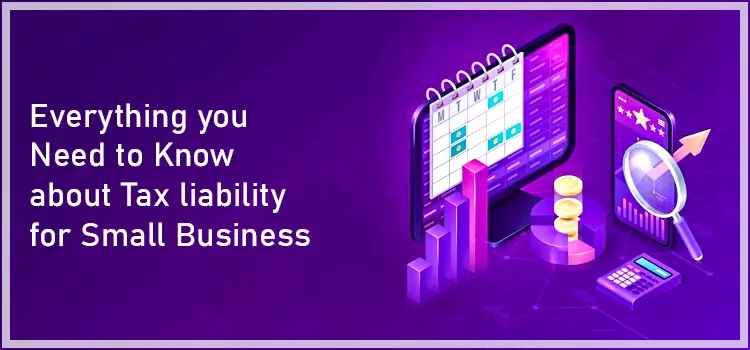
 Taxation
Taxation
Nearly every person wants to start a Small Business Enterprise to earn more than they make while working. However, no matter how attractive and inspiring a small business startup can look, it is a very hectic job, and one should be responsible for each and everything. One of the main responsibilities you need to handle is the tax obligations for small businesses, and for that, you need to understand each and everything under the topic clearly. Here we will discuss everything you need to know about the tax liability for small businesses.
What Do You Mean By Tax Liability?
Let us start from the beginning, i.e., what is Tax Liability for Small Businesses as it is an important thing mandatory to understand without which you cannot handle business on your own. In general, a Liability is something/money which, as a business, you owe to the government. In order to pay your Tax Liabilities, you need to maintain a record and pay annually.
Tax obligations for small businesses are never the same for each and every small enterprise, as they vary according to the business’s legal structure. Thus depending on your business structure, you need to look out for various tax Liabilities which you need to pay during your small business. Read further for more information about tax Liability.
Employer Identification Number
Before we start to discuss more tax responsibilities for small businesses, we need to first understand the Employer Identification Number (EIN), also known as Federal Tax Identification Number, which is a unique 9-digit number assigned to each and every business entity in the United States by the Internal Revenue Services(IRS). This number is used by the IRS to identify your business entity and is offered free and assigned immediately.
It is mandatory for small businesses to get an EIN number after they register themselves.
Various Types of Tax Liabilities on Small Business
As a small business owner, you need to pay the following taxes:
- Income Tax: Every business owner needs to file an annual income tax return based on the income or profits you have earned or the money you have received every year. The calculation of income tax varies as per the business structure of the entity. You need to pay these taxes on time; otherwise, you might need to pay the estimated taxes.
- Estimated Tax: In case your federal income tax, which has been withheld, is not enough to cover the tax you need to pay, then you have to pay estimated taxes.
- Self-Employment Taxes: Business owners need to pay their own social security and Medicare taxes. After paying these taxes,you will get various benefits like social-security , health and medical benefits.
- Employment Tax: As an employer, you need to pay taxes that will cover your employee’s social security benefits and medicare. Three types of taxes come under employment taxes:
- Social Security and Medicare taxes
- Federal Income tax withholding
- Federal Unemployment Tax (FUTA)
- Excise Tax: Excise means any tax imposed on goods and products at the moment they are manufactured. Goods under excise taxes are sold within the country under the license granted for certain activities.
- Property Taxes: Every business person has to pay taxes for the property at which they operate their business. Property tax changes in different states.
- State and Use Taxes: Sometimes, the states can impose a tax on the goods and products you are selling or services you are providing. This tax is not imposed on every good or product. .
How to Calculate Tax Liabilities for Small Businesses?
One very common question which comes to mind of every small business owner is, “how much tax do I need to pay.” The Answer to this question is not the same for each business entity and does not only depend on the total revenue generated by the company. Tax Liabilities for small business are calculated on the basis of following factors
1. Your Business Structure: Not every business entity is charged the same calculated tax based on their incomes. Tax responsibilities on small businesses also depend on organization structures discussed below:
- Sole Proprietorship: A single person who owns a whole business is called a proprietor and the business is called Sole Proprietorship.
- Partnerships: Business owners jointly by more than one person. Individuals need to pay taxes depending on their share of the total business income.
- Corporation: Two or three people together as a single entity forms a corporation. Under this corporation, people exchange money, goods, and property to form capital. Net profit which the corporation has made gets distributed among shareholders. Taxation is quite different in the case of a corporation. First, the tax is calculated from the total profit made by the corporation, and afterward, the individual shareholders have to pay taxes. Thus, we can say double taxes.
- Partners in LLCs are liable to taxes based on their share in the company’s net income.
2. Taxes Differ as per the state laws and regulations in which they are operating.
3. Small Businesses have to pay various taxes apart from income tax, like capital tax, dividend tax, payroll tax, and various types of taxes mentioned above depending on their location, organization structure, and other factors.
How Can I Reduce Tax Liabilities on Small Scale Businesses?
You can reduce your Tax liabilities for small business through following ways:
- Health Insurance: IRS provides special advantages to people who pay for their own health insurance.
- Under Section 199A, if you report business income on your personal ITR, then you can claim for qualified business income deduction.
- You can also claim for deduction in tax liabilities on the bases of depreciation expenses.
- You can also use your home as the main center for your business activities. In that case, you might reduce your tax bill.
- You can also apply for Tax Exempt status in order to make a compulsory payment. You can claim Tax Exempt status on various taxes like income tax, property tax, charitable tax, and others. For that, you need to check the official website of the IRS.
Conclusion
From the above information provided above, we hope it might have provided you an insight into tax liabilities for small businesses. However, in case you still have any doubts regarding taxes, you can contact us at +1-866-408-0444. We will be present there to assist in responding to your query asap.

